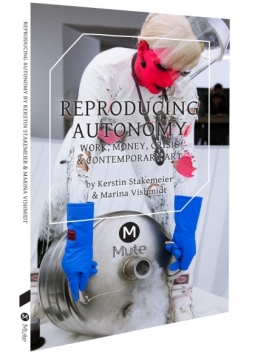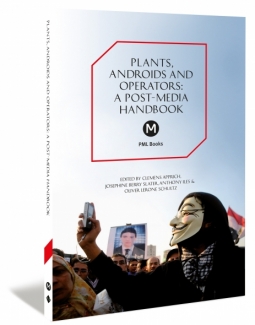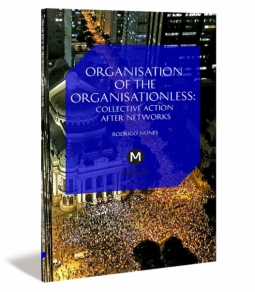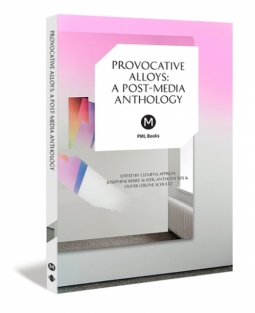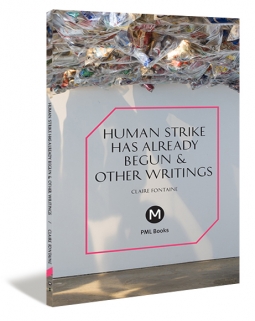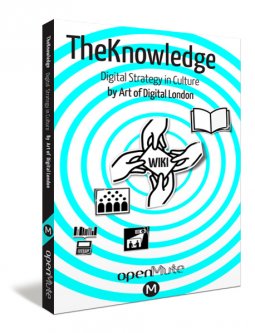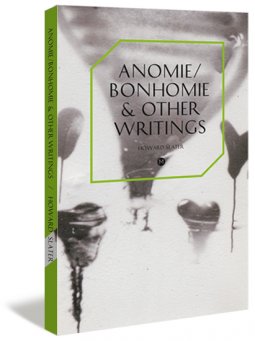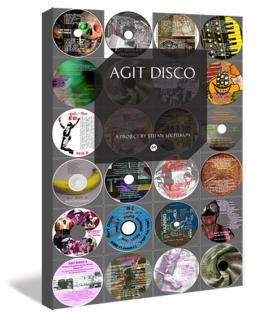Mute Books
Reproducing Autonomy: Work, Money, Crisis and Contemporary Art
By Kerstin Stakemeier & Marina Vishmidt
ISBN paperback: 978-1-906496-99-9
eBook: 978-1-906496-71-5
Mute Books, May 2016
Price paperback £14 15€ $18 - available from your local bookstore via our distributor Anagram or via online retailers.
Progress in autonomy cannot be – nor historically has it ever been – measured in quantitative units. Rather, the need for autonomy is repositioned in relation to society’s political, economic, and cultural developments on an ongoing basis. What do we mean when we speak of ‘autonomy’ and ‘reproduction’ in the field of contemporary art? What kind of objects do these terms encompass, what are their histories, and what internal logical relations can we identify between these concepts? How do they operate in a philosophical discourse about art and in political theory and practice?
In this book, Marina Vishmidt and Kerstin Stakemeier analyse ‘autonomy’ and then ‘reproduction’, in the understanding that this method of categorical isolation must be overcome if we are to reach towards the relationship of the two terms. These three essays establish a new framework to locate notions of artistic autonomy and autonomies of art. The texts not only offer an entrance into thinking about the role that autonomy has occupied in modern European intellectual history; they also put forward an original thesis.
Countering liberal conceptions of the autonomous entrepreneurial subject, Kerstin Stakemeier and Marina Vishmidt side with those cast in the role of the heteronomous, such as domestic and reproductive workers. From the vantage point of reproductive labour, Stakemeier and Vishmidt make a compelling case for the ongoing relevance of the notion of autonomy in the context of art, beyond and against modernist accounts of self-sufficient artworks produced and received by self-sufficient subjects. Vishmidt and Stakemeier operate like true feminist materialists, looking more than a little bit closer, and tarrying with thought as a mode of praxis.
– Sven Lütticken, Editor of Art and Autonomy (Afterall, 2016)
Whereas classical positions of the Left oscillate between a total rejection and an unconditional embrace of the concept of autonomy in Art, Kerstin Stakemeier and Marina Vishmidt do both at the same time. Within a strictly materialist approach they reconstruct the function of the concept within the transition from formal to real subsumption under Capital, thus showing its intrinsic conjuncture with the reproduction of social relations. As such, however, the concept is not rejected completely, but appropriated as a horizon for practices of change in terms of an ongoing autonomisation in politics and in art.
– Helmut Draxler
This outstanding multipart discursus on aesthetic autonomy begins with the constitutive ‘freedom’ of art production from the socially necessary abstract labour demanded of all other labour in the capitalist economy. After establishing this basic autonomy, the book proceeds to unfold other aspects that point to art’s simultaneous heteronomy in its present economic and social roles, and in so doing, unpacks salient contradictions regarding art’s imbrication, and privileged position within, capital’s conflict ridden present. The subordination of reproductive labour becomes important for the theoretical structure of this book. Throughout their argument, Stakemeier and Vishmidt trace connections between art, aesthetic autonomy and reproductive labour - the traditionally feminine labour of housework, child rearing, affective labour, among other things - and where they pursue the possibility that a more corrosive quality to that autonomy might result from their overlap, the work goes into truly uncharted territory.
– Melanie Gilligan
A German language edition will be published as "A-Autonomie" in autumn 2016 in the series "Kleiner Stimmungs-Atlas in Einzelbänden" by Textem Verlag, Hamburg. Kerstin Stakemeier, Marina Vishmidt: A - Autonomie, 16 Euro, 978-3-86485-128-5
Plants, Androids and Operators – A Post-Media Handbook
Print 978-1-906496-96-8
eBook 978-1-906496-97-5
Published 2014 by Mute Books
Download the PDF for free
Buy online at Amazon UK £14 and other outlets.
Print data: 229 x 152 mm, page 188, interior black and white, covers color, illustrations 22
Edited by Clemens Apprich, Josephine Berry Slater, Anthony Iles & Oliver Lerone Schultz.
This book documents the first life-cycle of the Post-Media Lab (2011-2014). Taking up Fèlix Guattari’s challenge, the Lab aimed to combine social and media practices into collective assemblages of enunciation in order to confront social monoformity. Here we draw together some key essays, images and art projects by the Lab’s participants, as well as a close documentation of its associated events, talks, and exhibitions, to create a vivid portrayal of post-media practice today.
With contributions by: Clemens Apprich, Josephine Berry Slater, Micha Cárdenas, Sean Dockray, Mina Emad, Bogdan Dragos & Inigo Wilkins, Fabien Giraud, Adnan Hadzi & James Stevens, Martin Howse & Jonathan Kemp, irational.org, Anthony Iles, Oliver Lerone Schultz, Gordan Savičić, Moritz Queisner, Rózsa Zita Farkas.
Part of the PML Books series. A collaboration between Mute & the Post-Media Lab
Table of Contents
Preface
Clemens Apprich, Josephine Berry Slater, Anthony Iles & Oliver Lerone Schultz
Digital Networks: Connecting People Apart
Mahalla, Manalaa, Tahrir, Maspero: Post-Media Nodes of the Egypt Spring
A conversation between Oliver Lerone Schultz & Mina Emad
Process Processed
Josephine Berry Slater
The Subsumption of Sociality
Notes on Subsumption
Anthony Iles
Destructive Destruction – An Ecological Study of High Frequency Trading
Inigo Wilkins & Bogdan Dragos
Field Notes from the Cloud
Sean Dockray
Seamlens
Gordan Savičić
The Question of Organisation After Networks
Immanence After Networks
Rózsa Zita Farkas
Movements of Safety, A Safety Movement, Safety in Movement
Micha Cárdenas
Click Social Activism? A Localisation of Political Participation After Networks
Moritz Queisner
Life vs. Object, Comrade Things and Alien Life
Mapping the Conjecture
Fabien Giraud
Stack, Heap, Frame
Martin Howse & Jonathan Kemp
Deckspace.TV reSynced
Adnan Hadzi & James Stevens
Organisation of the Organisationless: Collective Action After Networks
By Rodrigo Nunes
Series editors: Clemens Apprich, Josephine Berry Slater, Anthony Iles & Oliver Lerone Schultz.
Rejecting the dichotomy of centralism and horizontalism that has deeply marked millennial politics, Rodrigo Nunes’ close analysis of network systems demonstrates how organising within contemporary social and political movements exists somewhere between – or beyond – the two. Rather than the party or chaos, the one or the multitude, he discovers a ‘bestiary’ of hybrid organisational forms and practices that render such disjunctives false. The resulting picture shows how social and technical networks can and do facilitate strategic action and fluid distributions of power at the same time. It is by developing the strategic potentials that are already immanent to networks, he argues, that contemporary solutions to the question of organisation can be developed.
Buy on Amazon UK £4.25 and other regions, Super Saving free shipping.
Part of the PML Books series. A collaboration between Mute and the Post-Media Lab
Rodrigo Nunes is a lecturer in modern and contemporary philosophy at the Catholic University of Rio de Janeiro (PUC-Rio), Brazil. He coordinates the research group Materialismos (http://materialismos.tk), which investigates the resurgence of metaphysical speculation in contemporary philosophy and its interfaces with other fields such as politics, science and anthropology. He has been involved in several political initiatives over the years, such as the first editions of the World Social Forum and the Justice for Cleaners campaign in London. He is a member of the editorial collective of Turbulence (http://turbulence.org.uk).
Rodrigo Nunes is a co-editor of What Would it Mean to Win?, Turbulence Collective (Eds.), PM Press, 2010
Reviews of What Would it Mean to Win?
‘Powerful vision of the possible and the seldom-seen present.’
—Rebecca Solnit, author, Hope in the Dark and A Paradise Built in Hell
‘This kind of innovative thinking, which emerges from the context of the movements, opens new paths for rebellion and the creation of real social alternatives.’
—Michael Hardt, co-author, Commonwealth, Multitude and Empire
(2014. ISBN 978-1-906496-75-3; eBook ISBN 978-1-906496-82-1)
Digital Solidarity
By Felix Stalder
Series editors: Clemens Apprich, Josephine Berry Slater, Anthony Iles & Oliver Lerone Schultz
Published in association with Post-Media Lab Books
Buy on Amazon UK £4.25 and other regions, Super Saving free shipping.
(Winter, 2013. ISBN 978-1-906496-92-0; eBook ISBN 978-1-906496-93-7)
Felix Stalder’s extended essay, Digital Solidarity, responds to the wave of new forms of networked organisation emerging from and colliding with the global economic crisis of 2008. Across the globe, voluntary association, participatory decision-making and the sharing of resources, all widely adopted online, are being translated into new forms of social space. This movement operates in the breach between accelerating technical innovation, on the one hand, and the crises of institutions which organise, or increasingly restrain society on the other. Through an inventory of social forms – commons, assemblies, swarms and weak networks – the essay outlines how far we have already left McLuhan’s ‘Gutenberg Galaxy’ behind. In his cautiously optimistic account, Stalder reminds us that the struggles over where we will arrive are only just beginning.
Today, we are entering into a new constellation,
a new galaxy and the reformulation of solidarity in a
myriad of ways [...] There are new institutional
and cultural forms emerging to support such complex
webs of interaction and production, often based on the
notion of a shared resource, a commons, and focused on
the particular requirements necessary to develop and
protect that one resource. They offer a chance to remake
society in a particular way, through reinventing social
solidarity and democracy, be it in the digital networks
of informational cooperation or in the common
appropriation of physical spaces.
– Felix Stalder, Digital Solidarity
Other books by Felix Stalder
Vergessene Zukunft (Forgotten Future), Radikale Netzkulturen in Europa
By Clemens Apprich & Felix Stalder
“The refreshing perspective of this anthology reveals an
alternative interpretation of Internet culture beyond the
well-known, mythologising narrative of techno-libertarianism..”
– Martin Schmitt, sehepunkte, 13/5 (2013)
Cultures and Ethics of Sharing / Kulturen und Ethiken des Teilens
Edited by Wolfgang Sützl, Felix Stalder, Ronald Maier, Theo Hug
“This is a volume of essays about sharing. Few people could have predicted that practices of sharing would gain such prominence in contemporary society. It is, arguably, one of the most unexpected developments of the early 21st century. ”
– From the Introduction
Manuel Castells: The Theory of the Network Society
By Felix Stalder
“This book is a very beautiful model of how one mind engages with another: Felix Stalder has seized the essence of Manuel Castells′s work and its immense relevance to our time. Daring to be positively critical, Stalder enlarges and also defines Castells′s arguments. Thus the book multiplies Castells by Stalder and the result is an instant expansion of the mind of the reader.”
– Derrick DeKerckhove, University of Toronto
Provocative Alloys: A Post-Media Anthology
Edited by Clemens Apprich, Josephine Berry Slater, Anthony Iles and Oliver Lerone Schultz
Published in Association with Post-Media Lab Books
Buy on Amazon UK £12.99, Super Saving free shipping.
(Winter 2013. Print ISBN 978-1-906496-94-4; eBook ISBN 978-1-906496-95-1)
Featuring essays by Adilkno, Clemens Apprich, Alejo Duque, Gary Genosko, Michael Goddard, Félix Guattari, Brian Holmes, Felipe Fonseca, Howard Slater, Cadence Kinsey, Oliver Lerone Schultz, Rasa Smite & Raitis Smits
Félix Guattari’s visionary term ‘post-media’, coined in 1990, heralded a break with mass media’s production of conformity and the dawn of a new age of media from below. Understanding how digital convergence was remaking television, film, radio, print and telecommunications into new hybrid forms, he advocated the production of ‘enunciative assemblages’ that break with the manufacture of normative subjectivities.
In this anthology, historical texts are brought together with newly commissioned ones to explore the shifting ideas, speculative horizons and practices associated with post-media. In particular, the book seeks to explore what post-media practice might be in light of the commodification and homogenisation of digital networks in the age of Web 2.0, e-shopping and mass surveillance.
“The element of suggestion, even hypnotism, in the present relation to television will vanish. From that moment on, we can hope for a transformation of mass-media power that will overcome contemporary subjectivity, and for the beginning of a post-media era of collective-individual reappropriation and an interactive use of machines of information, communication, intelligence, art and culture.”
– Félix Guattari, Towards a Post-Media Era
Other books by Clemens Apprich, Josephine Berry Slater & Anthony Iles
Vergessene Zukunft (Forgotten Future), Radikale Netzkulturen in Europa
By Clemens Apprich & Felix Stalder
“The refreshing perspective of this anthology reveals an
alternative interpretation of Internet culture beyond the
well-known, mythologising narrative of techno-libertarianism..”
– Martin Schmitt, sehepunkte, 13/5 (2013)
Proud to be Flesh: A Mute Magazine Anthology of Cultural Politics After the Net
Co-edited by Josephine Berry Slater & Pauline van Mourik Broekman, with Michael Corris, Anthony Iles, Benedict Seymour and Simon Worthington
“Proud to be Flesh indicates […] what we might call a topological media model, one that is founded on a distributed and immersed tracking of cultural and economic antagonisms and events. Less the communication of a message, the political product here is precisely the intensive field of collective problematisation that is brought into being.”
– Nick Thoburn, New Formations
Noise and Capitalism
Co-edited by Anthony Iles and Mattin
“Yes, this book is different (in a really useful way), because its aim is to
make politics its subject just as much as music, and to see the two as fundamentally linked, hence the equal weighting (noise and capitalism).”
– David Grundy, Eartrip magazine
Human Strike Has Already Begun & Other Writings
By Claire Fontaine
Published in Association with Post-Media Lab Books
Buy on Amazon UK £5 and other regions, Super Saving free shipping.
(Winter, 2013. Print ISBN 978-1-906496-88-3; eBook ISBN 978-1-906496-89-0)
The term ‘human strike’ was forged to name a revolt against what is reactionary even – and above all – inside the revolt. It defines a type of strike that involves the whole of life and not only its professional side, that acknowledges exploitation in all the domains and not only at work. The human strike is a movement that could potentially contaminate anyone and that attacks the foundations of life in common; its subject isn’t the proletarian or the factory worker but the ‘whatever singularity’ that everyone is. This movement isn’t there to reveal the exceptionality or the superiority of one group or another, but to unmask the whateverness of everybody as the open secret that social classes hide.
Founded in 2004, the Paris-based collective artist Claire Fontaine declares a position as a ‘readymade artist’. Having assumed the name of a popular French brand of notebooks, her practice centers on the production of works in neon, video, sculpture, painting and text. Her neo-conceptual art targets the exchangeability and disintegration of notions of authorship. Her position stems from the awareness of the shared condition of political impotence and the crisis of singularity within contemporary society today.
Comments by Claire Fontaine
John Kelsey: Did you produce any work today?
Claire Fontaine: No, I would prefer not to.
– from an interview with Claire Fontaine by John Kelsey, http://www.clairefontaine.ws/interviews.html
Anthony Huberman: You’ve said, ‘Claire Fontaine is composed of assistants, its management is an empty center.’ By wanting to be nothing more than her assistants, what are you running from?
Claire Fontaine: Being assistants […] represents an explicit position of cooperation, where compromises and discussions are very important and where the cult of the romantic, self-centered, and inspired artist is finally pulverized. This is an emancipating position: refusing to be victim of a stereotype is always very liberating.
– from an interview with Claire Fontaine by Anthony Huberman, Bomb/105, Fall 2008
It is the knowledge of the use of digital tools in a cultural context from its practitioners that we have called peer learning. Building on the experience of practitioners, addressing the needs of cultural organisations across all sizes and covering opportunities for artistic development to operational areas of production, we have put a series of articles and research using the collaborative writing tool, a Wiki.
Book 978-1-906496-68-5
eBook 978-1-906496-69-2
In this collection of writings, Howard Slater improvises around what Walter Benjamin could have meant by the phrase 'affective classes'. This 'messianic shard' and its possible implications leads Slater to develop a therapeutic micro-politics by way of a mourning for the Workers' Movement and a grappling with the 'becomings of capital'. The essay 'Anomie/Bonhomie' is the keystone of this book which also features tributary texts and poems drawn from the past ten years. These supplementary texts approach such themes as exodus, species-being, surrealist precedents, poetic language and the possibilities for collective 'affective' practices to combat capitalism's colonisation of the psyche.
Howard Slater is a volunteer play therapist, sometime writer and ex-housing worker. Whilst he has been writing since the early 1980s he has mainly been published in small press magazines, independent publishing initiatives and web sites. His texts and poetry have been supported and published by: 10th Floor, Alien Underground, Audiolab Arteleku, Autonomedia, Autotoxicity, Break/Flow, Copenhagen Free University, Datacide, Difficult Fun, Fatuous Times, Five Leaves Left, Here & Now, Infopool, Infotainment, Mute, Night Class, Noise Gate, Obsessive Eye, Palantir, Papakura Post Office, Penniless Press, Rebel Ink, Resonance Magazine (LMC), School of Walls & Space, Smile, TechNET, Variant, Working Press.
ISBN 978-1-906496-72-2
Date of Publication: 1/2012
152 pages
Agit Disco collects the playlists of its 23 writers to tell the story of how music has politically influenced and inspired them. The book provides a multi-genre survey of political musics, from a wide range of viewpoints, that goes beyond protest songs into the darker hinterlands of musical meaning. Each playlist is annotated and illustrated. The collection grew organically with an exchange of homemade CDs and images. These images, with their DIY graphics, are used to give the playlists a visual materiality.
Almost everyone makes selections of music to play to themselves and friends. Agit Disco intends to show the importance of this creative activity and its place in our formation as political beings. This activity is at odds with to the usual process of selection by the mainstream media - in which the most potent musical agents of change are, whenever possible, erased from the public airwaves.
Agit Disco Selectors: Sian Addicott, Louise Carolin, Peter Conlin, Mel Croucher, Martin Dixon, John Eden, Sarah Falloon, Simon Ford, Peter Haining, Stewart Home, Tom Jennings, DJ Krautpleaser, Roger McKinley, Micheline Mason, Tracey Moberly, Luca Paci, Room 13 – Lochyside Scotland, Howard Slater, Johnny Spencer, Stefan Szczelkun, Andy T, Neil Transpontine, Tom Vague
ISBN 978-1-906496-51-7
Date of Publication: 1/2012
Reviews
Quotes from Jim Donaghey, (2012): Review in Anarchist Studies 20.2 p.126
Agit Disco encourages an exploration of genres we might otherwise be unfamiliar with , and helps to draw out the interweaving currents of influence across politically engaged musics.
Agit Disco is highly effective in sparking a reconsideration of the reader's or listener's experience of music and politics, and this book element of the wider project will surely encourage others to begin their own dialogues, and contribute to those million compilation CDs that Szczelkun hopes for.
Quotes from Mat Callahan (2012): Agit Disco, Socialism and Democracy, 26:3, pp212-217
The music industry long ago made pop music journalism an extension of its dominance over music production, distribution and consumption. Agit Disco has the great virtue of enabling informed discussion of music by people who clearly cherish the music they are discussing. The value of music, therefore, is of a different order of magnitude than that of a disposable unit manufactured for financial gain. What comes across is a love and respect for music, a celebration of music's timeless role in the life of communities and in their resistance to oppression.
An outstanding feature of this book is the broad range of artists, styles and eras, its inclusiveness exemplifying the archival framework on which the project rests. Through the choices made and the reasons given for making them, social history is told.
While openly declaring that they are not trying to be encyclopaedic […] the editors have assembled ample data to disprove the claims of the music industry mouthpieces that what the masses really want is entertainment.
Agit Disco performs a service that is sorely needed since it simultaneously celebrates the community-forming function of music while demonstrating the universality of this function for all oppressed people.
The Task Agit Disco sets out to accomplish, therefore, bears a superficial resemblance to both cultural studies and pop music journalism while on a more profound level making a critique of both. That this critique comes in the form of a praxis as opposed to a conventional polemic is actually part of the critique - targeting self-proclaimed or institutionally sanctioned 'experts' who in addition to passing judgement on what is good music and its proper relationship with politics, rule out the intelligence and creativity of working-class and other supposedly less qualified people.
Quotes from anon (2012) Neural: The Illegal Issue Issue 42 p.19 (Italy)
It's a brilliant idea, defining in a limited space (the CD, a medium that can circulate, but with very little amount of storable music compared to any current mp3 reader) a personal political path, finding unreliable connections within the track list, but still reflecting the connection between popular music and working class politics. The combination of the slow reading on paper and the listening establishes a strong base for collective awareness and political discourse.
Quotes from Phil England (2012) The Wire, April 2012, p.75
Szczelkun is helping create a dynamic alternative understanding of what might constitute political music from the ground up.
The personal selections inside, directly or indirectly, prompt all kinds of questions, reanimating them as a living dialogue in the present.
Ekin Sanac 'Music and Agitation' interview with Stefan Szczelkun and Anthony Iles published in BANTmag February 2012 (Turkey) http://www.bantmag.com/mag/04/page/view/448
Also see Blog reviews by Simon Poulter and Duncan Reekie: http://www.viralprojects.com/?p=677 http://www.academia.edu/1418265/The_Book_of_the_Song
Edited by Simon Worthington, Damian Jaques, Pauline van Mourik Broekman and Adrian Shaughnessy
A new history from 8 Books charts the journey that this seminal title has made under the direction of co-founders Simon Worthington and Pauline van Mourik Broekman. It also features much of designer Damian Jaques' 'raw HTML-like aesthetic', as Adrian Shaughnessy has it in his introduction, in evidence during his tenure at Mute. - Creative Review, August 2008
'This is a visually and journalistically astringent take on the birth of the internet, and a reminder of the rich visual innovation of independent magazines.' - eye magazine, Summer 2008, John O'Reilly
Date of Publication: 25 April 2008
ISBN: 9780955432224
Mute Books Orders
For Mute Books distribution contact Anagram Books
contact@anagrambooks.com
For online purchases visit anagrambooks.com

